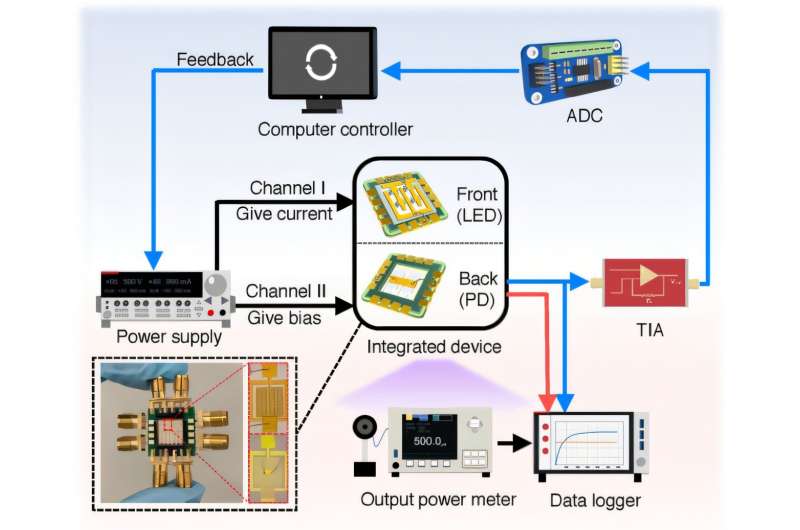
Schematic diagram of self-stabilizing luminescence system built with vertically integrated devices. Credit: Prof. Sun's team
A team led by Prof. Sun Haiding from the University of Science and Technology of China (USTC) developed a vertically integrated micro-scale light-emitting diode (micro-LED) array which was then applied in deep ultraviolet (DUV) maskless photolithography system for the first time. Their study was published in Laser & Photonics Reviews.
Photolithography plays a crucial role in the manufacture of integrated circuit chips and is one of the key core technologies in the semiconductor and microelectronics industries. Since the 1990s, low-cost, high-resolution maskless photolithography system has emerged as a hotspot in advanced lithography research. However, patents for this cutting-edge technology are predominantly held by Europe, the United States, Japan and South Korea, creating significant technological barriers.
In this context, Prof. Sun's iGaN team has conducted extensive research on DUV micro-LEDs over the years and innovatively proposed a maskless photolithography system using a DUV micro-LED array as a light source.
They systematically designed and optimized the epitaxial structure, device dimensions, sidewall profile, and geometric shape of the DUV micro-LED, significantly improving its power efficiency, modulation bandwidth, and multifunctionality in UV light detection, imaging and sensing. Building upon this, the team successfully developed an array system based on these DUV micro-LEDs.
In this work, the team further proposed and fabricated a DUV display integrated chip, leveraging the advantages of the DUV micro-LED's ultra-small size and ultra-high brightness. They proposed a three-dimensional vertically integrated device architecture with an AlGaN-based DUV micro-LED array and zinc oxide (ZnO)-based photodetector (PD) side-by-side via a transparent sapphire substrate.
In this architecture, the UV photons emitted from the DUV micro-LED array can penetrate the transparent sapphire substrate and be captured by the PD on the backside of the substrate, enabling efficient optical signal transmission.
Furthermore, the team developed a self-stabilizing luminescence system with a closed-loop feedback control based on the vertically integrated device. This system can not only monitor fluctuations of the output light intensity of the micro-LED array, but also provide continuous feedback to ensure stable output power.
The test results showed that the device with a self-stabilizing system maintains high light intensity and long-term stability while the light intensity of the device without feedback gradually decreased over time.
Using the feedback system, the team demonstrated a DUV micro-LED array with a high pixel density of 564 pixels-per-inch (PPI) and successfully displayed a clear pattern on a silicon wafer after the maskless DUV photolithography, indicating potential in high-resolution photolithography technology. This is the first demonstration of DUV maskless photolithography based on a DUV micro-LED active matrix.
This research developed a novel integrated device combining DUV micro-LED array and PD, showcasing significant application prospects for future maskless photolithography systems. It also lays the foundation for the future development of highly integrated and multifunctional 3D optoelectronic integration systems.
In the next phase, the team will focus on further reducing the size of individual micro-LEDs and PD, thereby increasing the density and integration of arrays per unit area. They will also optimize the performance of individual devices and the uniformity across large wafers, paving the way for higher precision in maskless photolithography technology.
TrendForce 2024 Micro LED Market Trend and Technology Cost Analysis
Release: 31 May / 30 November 2024
Language: Traditional Chinese / English
Format: PDF
Page: 160-180
TrendForce 2024 Deep UV LED Market Trend and Product Analysis
Release Date: 31 March, 15 September 2024
Languages: Traditional Chinese / English
Format: PDF / EXCEL
Pages: 50-60 / Semi-Annual
|
If you would like to know more details , please contact:
|












